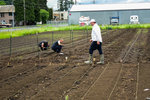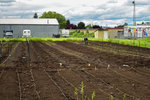





SNAP-Ed, the nutrition education program run through the Washington State University extension, is broadening its outreach in Lewis County, aiming to help more people learn how to eat healthy on a budget.
“In Lewis County, 21 percent of individuals are on SNAP benefits, so fairly high,” said Elizabeth Stratton, the SNAP-Ed program manager for the region. “The places that we’re focusing SNAP-Ed work in Lewis County are in schools, farmers markets and food banks. … We’re helping to encourage them to eat healthy and stay physically active.”
The Supplemental Nutrition Assistance Program is federally funded, providing benefits to help low-income individuals purchase basic food needs. SNAP-Ed seeks to bolster that assistance with education. The SNAP-Ed program is funded by the U.S. Department of Agriculture, Washington State University and local partners.
In Lewis County, SNAP-Ed’s efforts have been focused on the Chehalis School District and farmers market, as well as the Salvation Army food bank in Centralia. Its staff does cooking demonstrations and hands out tipsheets for healthy eating.
At the Salvation Army food bank Tuesday afternoon, Stratton handed out information about the nutritional benefits of lentils while Melissa Davis — the program’s nutrition educator — dished up lentil tacos. Bags of lentils were free for clients to take home and cook for themselves, which at least one did after trying a taco sample. Stratton said SNAP-Ed also plans to help with the Salvation Army’s community garden.
“We could potentially do some garden education programming out there and use the produce they’re growing in our food demos to help promote the produce,” she said.
Meanwhile, Davis and Stratton are planning to expand their programming to the Centralia School District and farmers market. The schools in particular represent a key sector for SNAP-Ed, as the Centralia School District has a high rate of students who qualify for free and reduced lunch.
“There’s a high need there,” Davis said.
Last year, the program delivered 12 educational trainings in Lewis County, with 300 total participants. Another seven direct education series were provided for low-income families. SNAP-Ed helped the Salvation Army convert its food bank to a choice model and added nutrition education classes there.
Tuesday, program leaders met with county commissioners to outline the work they’re doing and seek advice about future areas of outreach.
“We talk about needs and demographics, we know our community can really use the help that you can provide,” said commissioner Edna Fund.
County commissioner Gary Stamper urged Stratton and Davis to look at the need in his rural East County district, where he long served as an educator.
“It’s really all over the county. The dynamics of family have changed drastically,” he said. “When you sit there and you see the lunch line and every one of these kids get (free) meals). … It’s got to be all about education.”
Stamper suggested the program reach out to school districts and local business leaders to look at possible places to expand. SNAP-Ed leaders noted that their funding has not increased, and any expansion they do will need to happen “slowly and sustainably.” Still, they said they were happy to have the ear of local leaders as they move forward.
“They know the county really well, so it’s great to get a chance to talk with commissioners and get their viewpoint of the county and where they see the need, Stratton said. “It’s a big county.”